Supporting Guelph General Hospital
Guelph General Hospital - The McKillen Foundation is pleased to support the Guelph General Hospital through the Foundation of Guelph General Hospital to provide high priority patient care equipment that will help the team at Guelph General provide the best possible care to everyone in the wider Guelph community. The Foundation of Guelph General Hospital is dedicated to carrying out its mission of saving lives and improving health, together with the community by raising financial assistance to cover important equipment purchases which exceed the capacity of their Ministry of Health-funded budget.
New Chemotherapy Chairs at Credit Valley Hospital
Credit Valley Hospital - The McKillen Foundation is pleased to continue its partnership with Trillium Health Partners (THP) Foundation in providing support for the Carlo Fidani Regional Cancer Centre at Credit Valley Hospital. Our donation this year was used to provide new chemotherapy chairs for the cancer centre. The new chairs are comfortable, easy to recline, have the ability to lie flatter for cardiac arrest events, and make it easier for the staff to intervene earlier during emergency situations. The chemo chairs have a sleek look and are seen to be much more inviting when compared to the cracked and damaged older chairs previously in use at the cancer centre. The new chairs are also easier to clean, allowing the team to adhere to infection prevention and control recommendations.
The cancer centre manages over 13,000 radiation clinic visits for almost 4,000 patients per year. As the population continues to grow in Mississauga and Peel and Halton regions, cancer case volumes continue to rise. Having access to advanced technologies enables the health care teams at THP to diagnose patients more rapidly and offer the most precise forms of treatment for the best possible outcomes. Trillium Health Partners Foundation is dedicated to raising the critical funds needed to address the highest priority needs of THP.
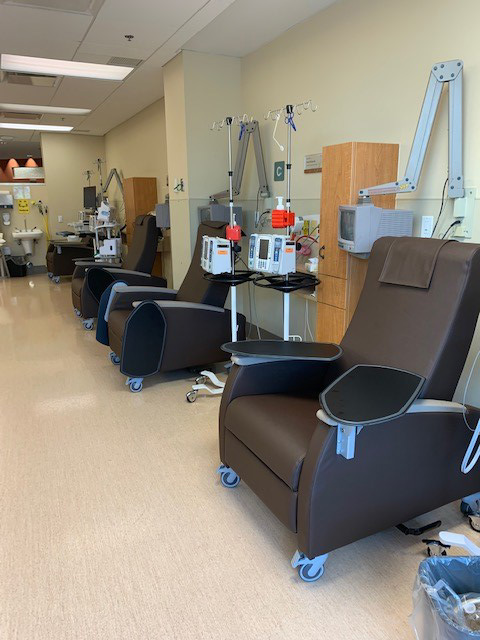 |
East Wellington Family Health Team
Rockwood, ON - we are pleased to support the work of East Wellington Family Health Team who provide medical care to residents of Wellington County, with clinics in Erin and Rockwood, by participating in their public appeal for financial assistance to cover important equipment which exceeds the capacity of their Ministry of Health-funded budget. Items on the wish list in 2022 included technological supports such as an enhanced phone system, additional laptops for more flexible work, segregated WIFI, as well as renovation of the physicians' workspace and installation of an integrated electrical generator for power outages.
 | 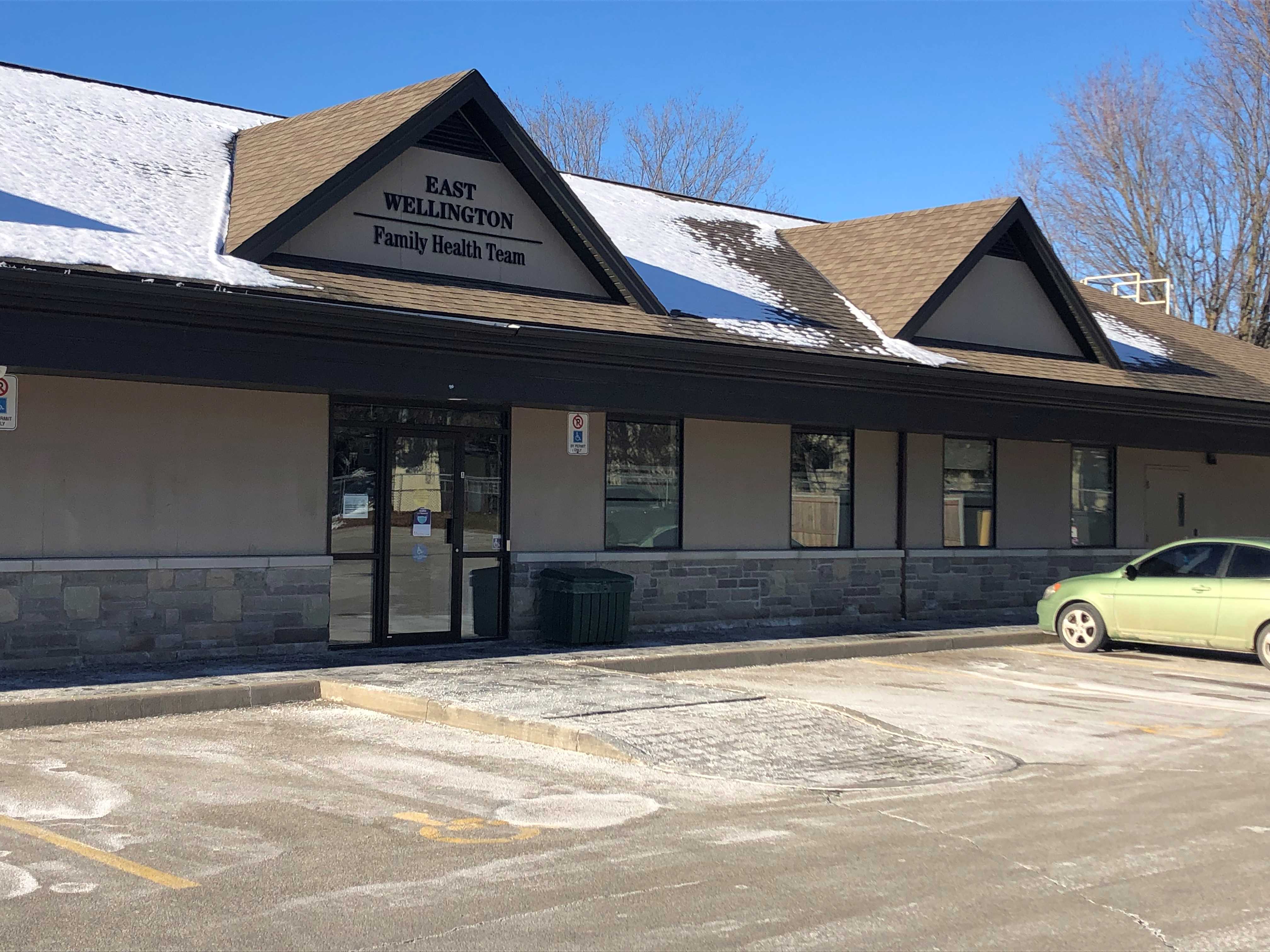 |
According to Kim Bell, EWFHT's Executive Director, "As a result of the successful appeal, the care of EWFHT's patients in the Rockwood area is no longer at the mercy of the weather. We can continue to remain open during power outages because lights, computers, electronic medical record system, heat, servers, and all that is required to ensure continuity of care, will continue to work rain, snow, or shine. In addition, the nursing staff will no longer be faced with driving in adverse conditions in order to “rescue” vaccines and other serums that require storage at a stable temperature."
Focus Forward for Aboriginal Youth
Focus Forward for Indigenous Youth is a registered charity that collaborates with Indigenous communities from across the country on culturally relevant employment and skills development opportunities for Indigenous youth.
Self-determination is at the core of all that they do. The organisation works nationally, collaborating with community partners to co-develop programming that provides Indigenous youth with opportunities to build new skills, develop a deeper understanding of themselves, create connections, and expand their thinking around education and career paths. Through this approach, Indigenous youth gain tangible skills to strengthen their communities for generations to come and create pathways to sustainable livelihoods.
The approach honors the whole person with experiential programming supporting Indigenous youth in navigating systemic barriers and provides skills to address them through the lens of a five pillar programme:
- Employment
- Leadership
- Mentorship
- Wellness
- Financial empowerment
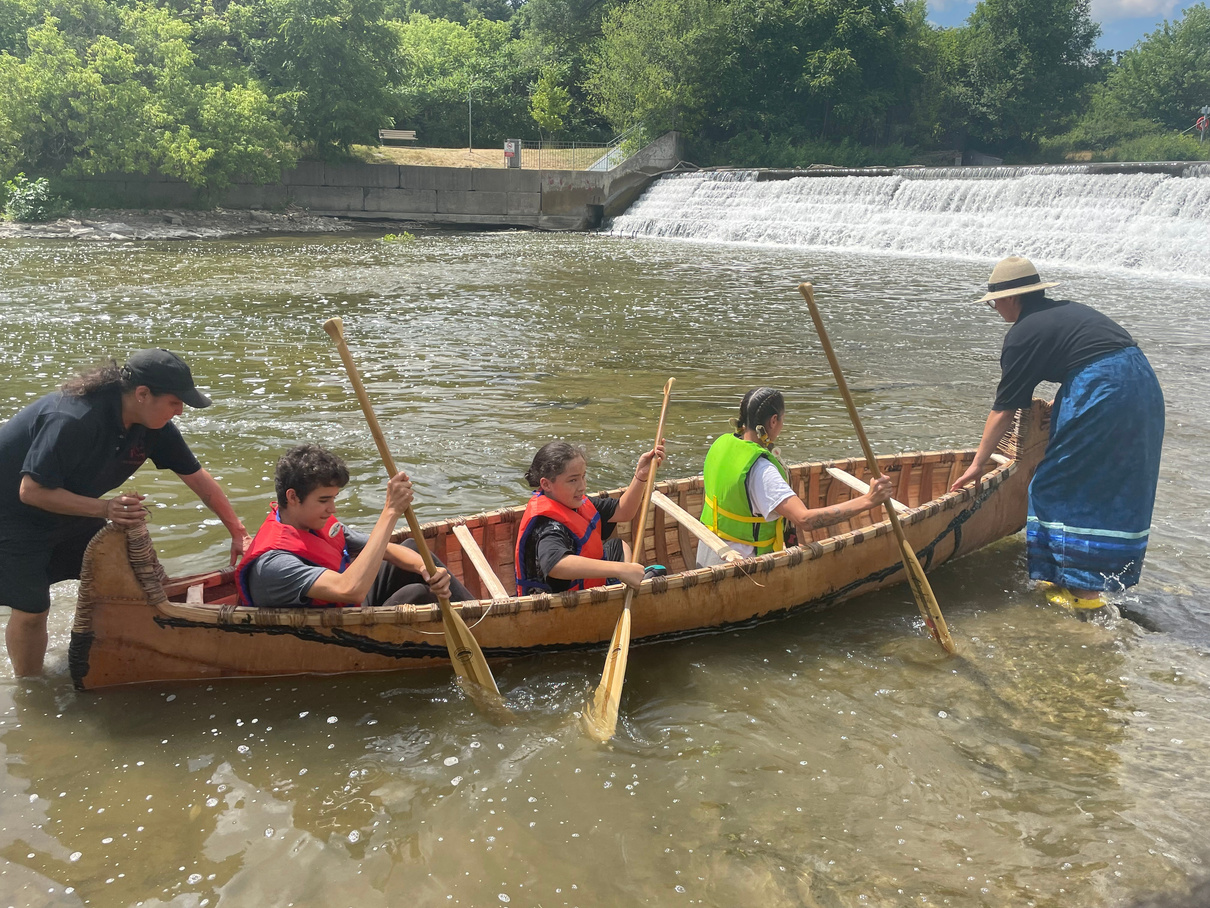 | 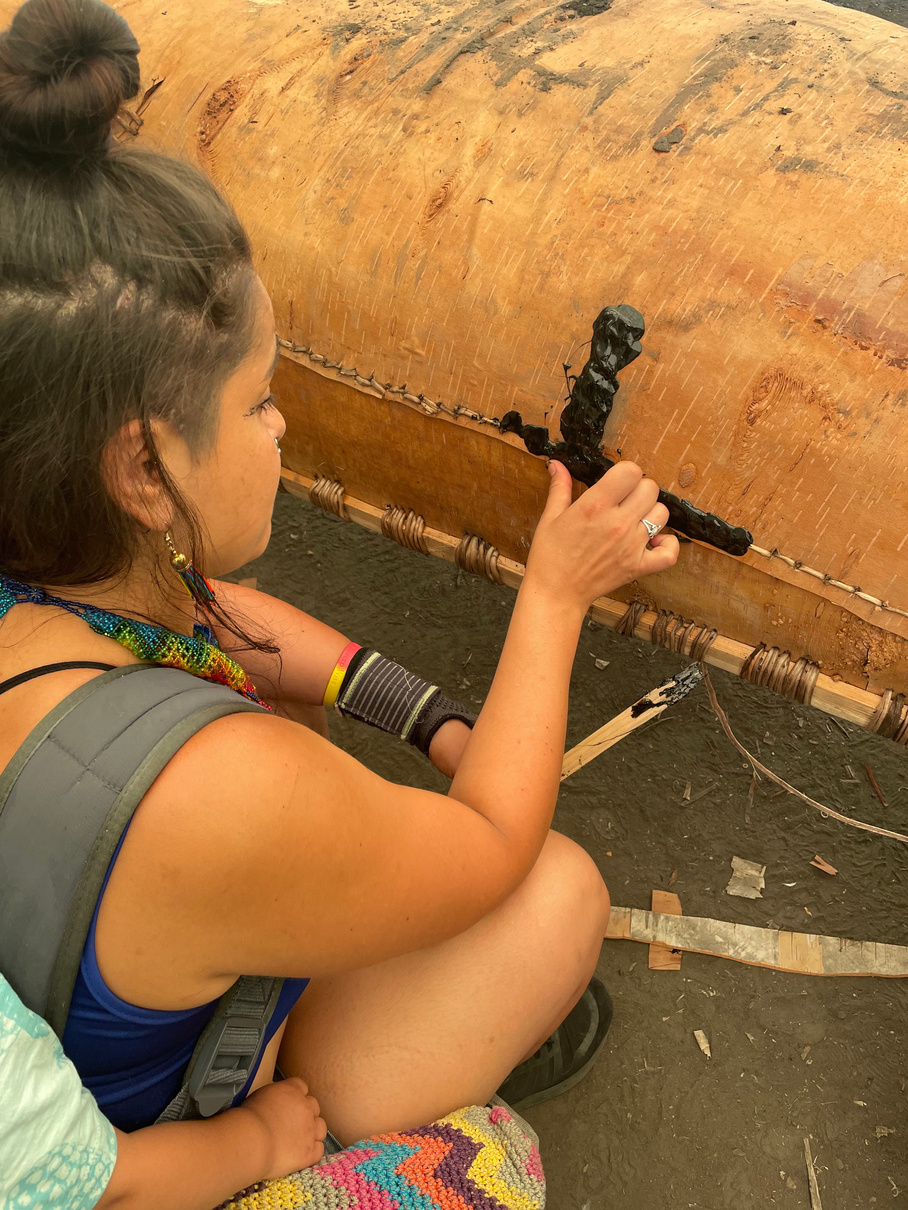 |
Through these pillars Focus Forward practices the values of youth first, community driven, learning focused, sustainable partnerships.
During the summer of 2022, as part of a Traditional Skills & Entrepreneurship programming, the McKillen Foundation partnered with Focus Forward for Aboriginal Youth, Wiingashn Indigenous Youth Mentorship Program and others to provide a hybrid virtual and in-person programme where Indigenous youth from Toronto had the opportunity to build and operate a traditional birch bark canoe.
HOPE House, Guelph
HOPE House - we are pleased to support the work and advocacy of Lakeside HOPE House located in the former Norfolk Street United Church building in downtown Guelph.
HOPE House offers tangible, compassionate assistance, and care to those in need in the greater Guelph community through immediate relief, and ongoing support, with the goal of a greater level of independence. HOPE House operates and advocates on the belief that poverty, food insecurity, inequality, health, and community are all interconnected. They offer services and programs that challenge the stigmas surrounding poverty and allow our community members to maintain their dignity and choice, while simultaneously providing them with tactile skills developed in a community environment; it is not about a hand-out, but rather offering people a hand-up, creating long-term skills that facilitate self-sufficiency.
Since April 2020, HOPE House has seen a 73% increase in new registrations to access poverty relief services. In addition, the Guelph Community Backpack Project saw the highest number of applications with 1,400 kids and youth looking for fully stocked backpacks to start the school year. Thanks to the support of the Guelph community HOPE House has been able to meet this increase in need to date.
Programmes and services provided by HOPE House include:
- Food market
- Hope Stylin' (clothing bureau and salon)
- Edu-kitchen and daily café
- Circles (assists low-income families move toward independence)
- Guelph Community Backpack Project (coordinated by Hope House in partnership with Guelph Neighbourhood Support Coalition and Salvation Army); collection, packing, and distribution of backpacks and school supplies for children and youth throughout Guelph
- Harvest of Hope
- Hope for the Holidays (Christmas hampers; Christmas brunch; cookie exchange; photos with Santa; affordable, pay-what-you-can Christmas market)
- Hope in Motion
- Hope Smiles (dental care program for community members who volunteer or participate in Circles)
Take a short Video Tour of HOPE House to see some of the impact that a donation can make.
Rockwood Food Bank
East Wellington Community Services - The McKillen Foundation is pleased to financially support the work of the East Wellington Community Services' Food Bank located in Rockwood, ON. Among other services to community residents, the Rockwood Food Bank assists residents of Guelph-Eramosa Township and the Town of Erin in need of emergency food supplies as well as operating a Christmas outreach program providing festive food and groceries, and gifts for children and family members.
Health Care is Universal but Access is not
 |
For a number of years, the McKillen Foundation has supported the work of Hope Air, in helping Canadians reach vital medical care. Hope Air, a Canadian national charity, provides Canadians with access to the healthcare they need, regardless of where they live on a needs basis. Hope Air is committed to providing families with flights, ferry tickets or bridge tolls and accommodations when they need to travel long distances for vital medical care. It is fundamentally important to reduce the stress of people who are already suffering – so they can focus on their health. In Canada 3.2 million people live below the poverty line including 566,000 children. Three in 10 Canadians require a visit to a medical specialist and 3 in 10 live outside larger cities and further from healthcare centres.
In partnership with its donors, Hope Air provided 6,762 travel arrangements for patients nationwide during 2022. This includes 4,760 flights, 1,702 nights of accommodation, 726 Bridge and Ferry Passes, 210 rides and 196 meals. The COVID-19 pandemic has been incredibly challenging for Canadians and those worldwide. Despite many obstacles, Hope Air has still been able to help patients reach the healthcare they need. In 2021, the top five reasons for patient travel were cancer (22%), cardiovascular disorders, musculoskeletal disorders, eye disorders and nervous system disorders.
Hope Air has let us know that during 2022, our donation has helped with:
- A 1 year old baby flew from Moncton to Toronto to get a liver transplant
- A woman from Prince George to Vancouver to donate her bone marrow to save a life
- 40-year-old man travelled from Grand Prairie to Saskatoon for treatment of his congestive heart
failure - A 30-year-old travelled from Edmonton to Montreal for gender-affirming surgery
- A 34-year-old travelled from Vancouver to London for immune system treatment
- A child travelled from Sault St. Marie to London for a neonatal disorder diagnosis
- And many other patients with urgent and life-threatening conditions
Helping Bring a Linear Accelerator to Credit Valley Hospital Cancer Centre
Credit Valley Hospital - The McKillen Foundation is pleased to partner with Trillium Health Partners (THP) Foundation in providing support to the Carlo Fidani Regional Cancer Centre at Credit Valley Hospital. Our donation will be used to help purchase a new linear accelerator for the cancer centre. A linear accelerator (or LINAC) is a piece of equipment that delivers high-energy X-rays that conform to the specific size, shape and location of a tumour, ensuring personalized, targeted radiation treatment. It is able to destroy cancerous cells in the targeted area with little to no impact to healthy tissue. The cancer centre manages over 13,000 radiation clinic visits for almost 4,000 patients per year. As the population continues to grow in Mississauga and Peel and Halton regions, cancer case volumes continue to rise. Having access to advanced technologies enables the health care teams at THP to diagnose patients more rapidly and offer the most precise forms of treatment for the best possible outcomes. Trillium Health Partners Foundation is dedicated to raising the critical funds needed to address the highest priority needs of THP.
 |
Building the Speech Profession in Ethiopia
Transforming Faces (TF) has been committed to transforming the lives of children born with cleft palate around the world and specifically building the local capacity of its partners in Ethiopia since 2007. Since 2014, the McKillen Foundation has partnered with Transforming Faces in the training of qualified speech therapists in Ethiopia.
Ethiopia continues to face high instances of cleft, and for years TF's long-term partner has been the only comprehensive cleft centre delivering care to the entire country. Because accurate information about the condition is scarce, families face shame and stigma at every turn. Many families live in poverty with limited access to the resources needed to cover the cost of a long-term comprehensive treatment plan. To address these challenges, TF and its trusted partners (Yekatit 12 Hospital and CURE Ethiopia Children's Hospital in Addis Ababa) have engaged in several initiatives to build the speech profession in Ethiopia, and ensure that long-term solutions to the severe shortage of qualified speech professionals is being addressed through the development of an academic degree program in Speech-Language Pathology at the University of Addis Ababa.
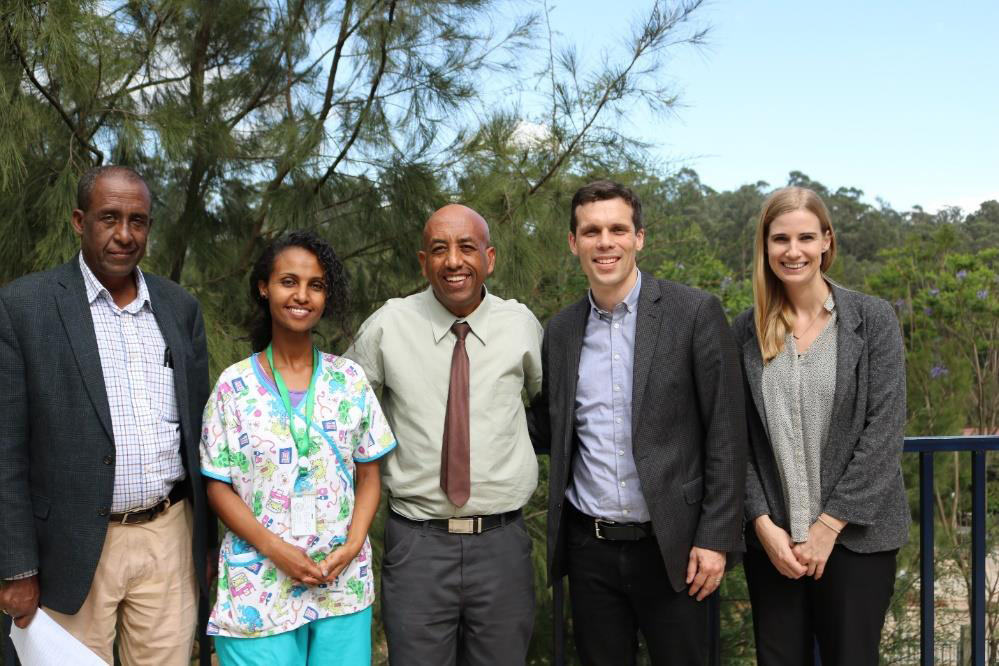 |
With the support of the McKillen Foundation and others, Transforming Faces has now brought Ethiopia to the cusp of a significant breakthrough: moving from one lone qualified speech professional delivering care in a country with a population of over 100 million, to 18 speech professionals since the first Speech-Language Pathology cohort graduated in July 2019. To support the work of TF in Ethiopia, please visit.
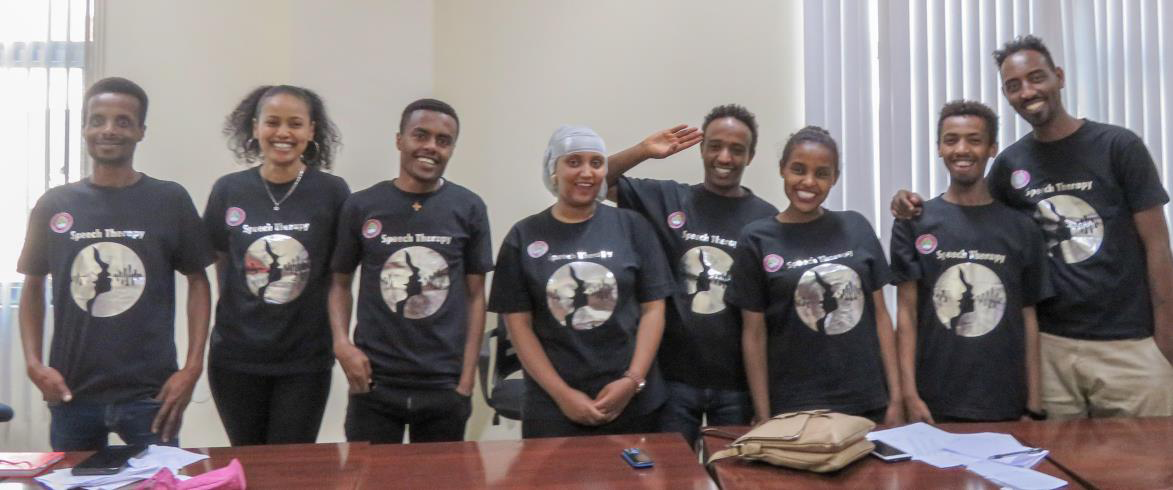 |
Bringing New Oncology Treatment Delivery to Credit Valley Hospital
Credit Valley Hospital - part of the Trillium Health Partners hospital group - primarily serves the communities of north Mississauga, Streetsville, Meadowvale, Erin Mills and surrounding areas. The hospital group is one of the largest community-based, academically affiliated, acute care facilities in Canada, encompassing three main campuses – Credit Valley Hospital, Mississauga Hospital, and Queensway Health Centre. In addition to offering a full range of acute care hospital services, CVH provides specialized programs including the regional centre of cancer excellence, the Carlo Fidani Regional Cancer Centre. Unveiled in 2005, the Regional Cancer Centre's services fall under the Mississauga-Halton/Central-West Regional Cancer Program. The Centre is integrated with the comprehensive and world-class oncology programme across Trillium Health Partners, ensuring each patient is treated with the utmost dignity, respect and compassion throughout their cancer journey.
The broad community that the Carlo Fidani Regional Cancer Centre serves has grown by 28 percent in only a decade. Within less than 20 years, that growth is projected to be over 60 percent while the provincial average is only 11 percent. As a result of the community's explosive growth, the Cancer Centre is experiencing unprecedented demand for their crucial services.
The McKillen Foundation is pleased to join with Trillium Health Partners Foundation in providing support for the Regional Cancer Program at CVH by funding the acquisition of a number of advanced technology syringe pumps which are used to deliver subcutaneous chemotherapy treatment. The new equipment reduces a patient's treatment time to under 30 minutes from up to three-hours required for intravenously administered chemotherapy treatment. The new equipment not only improves patient experience but also allows more patients to be treated at the Centre at any given time. This investment ensures that as our community continues to grow and change, patients will continue to have access to the right care, in the right place, at the right time.
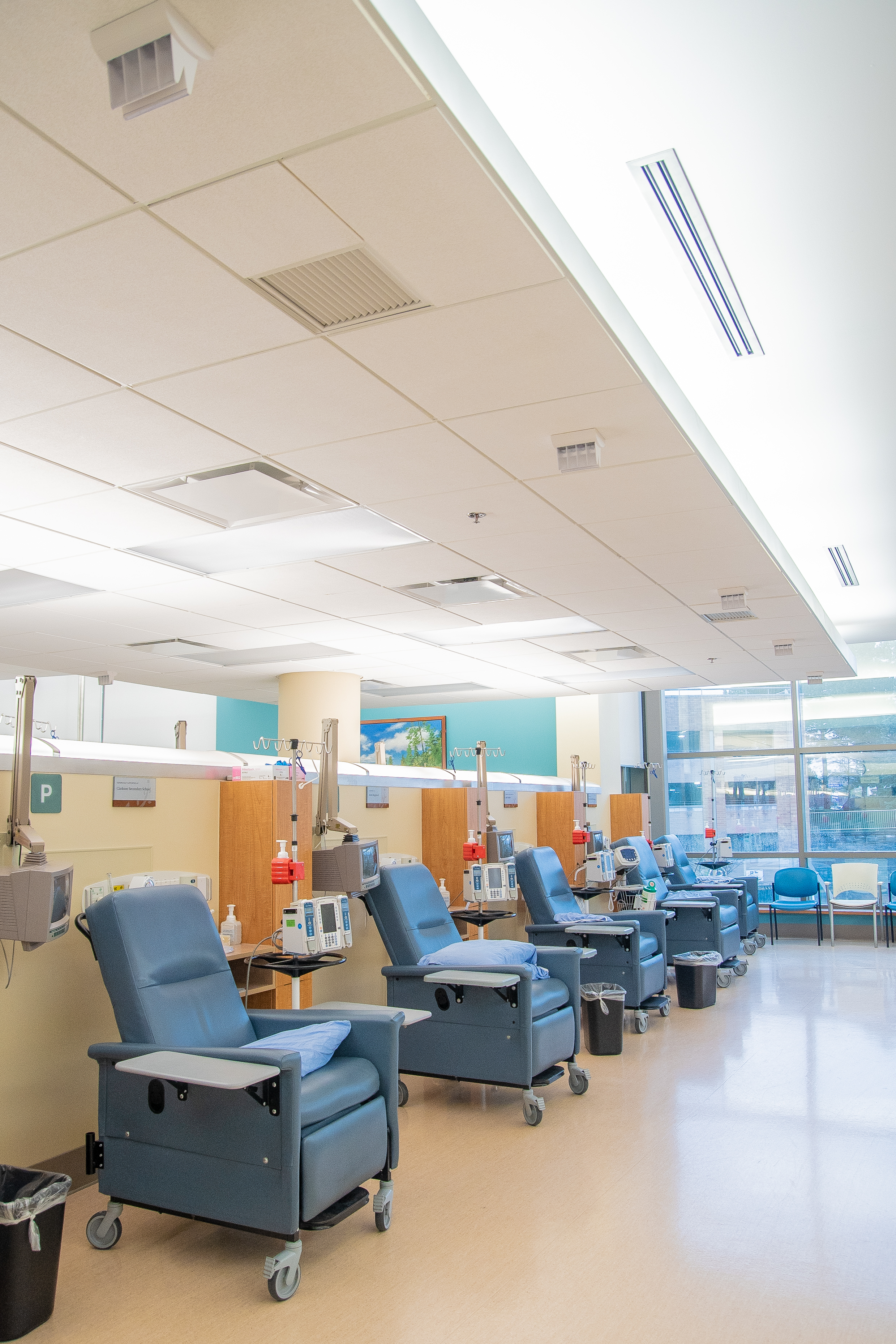 |  |
Trillium Health Partners Foundation is dedicated to raising critical funds needed to address the highest priority needs of the hospitals within Trillium Health Partners. Further information and to donate to the work of the Trillium Health Partners Foundation can be found here.
WE - Indigenous Programming
The McKillen Foundation continues to support and champion WE's leadership and empowerment programming for Indigenous youth in Canada. In 2018-19, the Foundation is helping WE provide support for specific Aboriginal and First Nations communities with increasing access to resources via technology. Many of the indigenous communities that WE seeks to engage often do not possess proper technological resources. They struggle to access WE's virtual leadership programming or the ability to access supplementary resources available to both teachers and students.
In 2018-19, WE will offer select communities computer hardware (tablets) and access to programming which will be accessible via the tablets. Such programming will include keynote speeches, action planning workshops for students and ongoing support and coaching as the students create and execute their own action plans. It will also enable them to access any programming WE offers to all schools virtually through the WE Global Learning Centre in Toronto, ranging from guest speakers to sessions that delve deeply into the challenges facing Canadian youth and children around the world.
Over the past year, the WE Global Learning Centre has been transformative for many young people in Indigenous communities across Canada. Through the building's resources and the Skype-technology in WE's Global Classrooms, WE has connected with students that have never been able to communicate with the outside world previously. The WGLC's Empatheatre provides a space where classes can come to both learn and share their knowledge with one another. Since opening in September 2017, WEGLC has hosted more than 100 school and youth events, and welcomed thousands of young people through their doors. Students who aren't able to attend can watch events through livestreams and on-line broadcasts, some of which have been viewed tens of thousands of times.
The McKillen Foundation joins with WE in the belief that these new investments will continue to be transformational for the youth of the participating indigenous communities.
Building Speech Language Pathology (SLP) Capacity in Ethiopia for Cleft Patients
Transforming Faces has been committed to building local capacity of its long-standing partner, Yekatit 12 Hospital, in Ethiopia since 2007. The Yekatit 12 hospital continues to be the only comprehensive cleft care centre in the entire country – which faces high instances of cleft palate and serves a population of over 100 million citizens. Because accurate information about the condition is scarce, families face shame and stigma at every turn. Many families live in poverty and with limited access to the resources needed to cover the cost of a long-term comprehensive treatment plan.
One of the key challenges in Ethiopia is the severe shortage of qualified speech professionals practicing in the country. Currently, Yekatit 12 is working with the only Speech Language Pathologist in the entire country. One of Transforming Faces primary focuses is on creating long-term solutions for the shortage of speech professionals.
The proposal to Build Speech Language Pathology (SLP) Capacity in Ethiopia is being supported during 2018 by the McKillen Foundation who has supported other initiatives of Transforming Faces in Ethiopia since 2014. The project will support university students currently enrolled at Addis Ababa University (AAU) as part of Ethiopia's first-ever university SLP program (which launched in 2015), and also support Yekatit 12 in training and employing a Speech Therapy Assistant to provide essential speech therapy to cleft patients at the hospital.
|
While surgery is important, it is just the beginning of the journey. In reality, cleft patients require years of treatments – including speech therapy, dental and orthodontic care, hearing assessments, and psychosocial support – which are rarely accessible or affordable in rural Ethiopia. Over half of all children born with cleft lip and palate (CLP) face speech and communication challenges, even after initial surgical repair. Receiving regular speech therapy is an essential part of the rehabilitative treatment – and with access to this care, most are able to develop intelligible speech by age five.
Transforming Faces follows a comprehensive approach not only physically 'transforming faces', but also radically altering the trajectory of a child's life by allowing them to finish school, develop healthy relationships, start families, and participate in society without the constant threat of discrimination. Transforming Faces directs 100% of all donations to its international programs, thanks to a private charitable foundation that covers administration and non-program costs. The McKillen Foundation is pleased to continue its association with Transforming Faces and with the work being conducted by the Yekatit 12 hospital.
A Resource Guide for Bringing Canadian Indigenous Culture and History into the Classroom
At the November 18th, 2016 WE DAY held in Winnipeg, Manitoba, WE (formerly Free the Children) announced a new resource for school programming planned and developed with ongoing financial support and guidance from the McKillen Foundation.
The program is designed to help teachers bring aspects of First Nations, Métis and Inuit culture into the classroom. In a climate of change, when Canada is ready to acknowledge its dark history of the treatment of Indigenous Peoples and seek reconciliation, teachers are poised to help create the biggest shift in national and generational mindset. "There is a serious lack of relationship between Indigenous and non-Indigenous Peoples," says Charlene Bearhead, Education Lead at the National Centre for Truth and Reconciliation.
|
Craig and Marc Kielburger, Co-Founders of WE, commented, "We are so grateful to our friends and champions who have supported the development of programming and resources for communities and educators that tell the stories of First Nations, Métis and Inuit. We would like to highlight the longstanding commitment of the Terence and Svea McKillen Foundation. Their guidance and mentorship has been unwavering and we are grateful for their support in developing this resource as a component of WE's programming."
Breast Cancer Research
The Foundation is supporting the National Research Initiative on Young Women and Breast Cancer of the Canadian Breast Cancer Research Foundation. Together with the Canadian Institutes of Health Research and Institute of Cancer Research (CIHR – ICR), CBCRF has announced a $5.7 million investment to support a pan-Canadian research team investigating breast cancer in young women.
A growing number of breast cancer cases in Canada occur before the age of 40. The relatively poor prognosis of young women with very early onset breast cancer suggests that women diagnosed before the age of 40 may best be treated differently than older women, in terms supportive care and self-management, making decisions about fertility preservation, the impact of breast-conserving surgery, treatment delay ramifications, and provision of optimal care through a multi-disciplinary approach.
Empowering Canada's Aboriginal Youth
To celebrate its 20th anniversary, Free the Children has developed some big visions for the next 20 years. Among these dreams is the desire to ensure that all Aboriginal youth across Canada have access to the types of educational resources that will equip them with the skills that they and indeed, all young people, need as they embark on a journey of creating change. Free the Children is on the brink of transforming education at home in Canada as well as in many communities around the world.
At the McKillen Foundation, we are proud to have been associated with Marc and Craig Kielburger and their team for a number of years and have witnessed the remarkable growth of the organization since both were youngsters.
We have watched We Days expand across three countries and Free the Children's domestic program, WE Schools, being adopted into more than 10,000 schools across Canada, the US and the UK.
Over the past three years, we have supported Free the Children in implementing a trial programme to bring their classroom resources and staff support to Aboriginal young people in several Cree communities of northern Quebec, providing leadership opportunites that would not otherwise be available to young people.
We are proud to have put our support behind this new vision for the next 20 years, enabling Free the Children to commence the process of enhancing their existing materials with supplementary resources for educators who work with Aboriginal and First Nations' youth throughout Canada. The goal is to introduce the programme and materials to educators for the 2016 academic year.
The Canadian Safe School Network – Stop Cyber Bullying
In 2016, the McKillen Foundation supported the launch of a new programme with CSSN and others for raising awareness and prevention of cyber bullying. The initiative, called the BullyStop Programme is a full-day interactive and creative event that involves high school and university students discussing social media and help put an end to cyberbullying by designing iOS apps. For further information, please click here.
The Safe Schools BullyStop program uses a ground up approach to learning about social media and cyberbullying directly from those who know it best: students. The Hackathons engage students in a discussion about cyberbullying and encourages them to share their own insights based on what they've witnessed or experienced online. Participants, are then invited to take part in a friendly competition to build mobile apps that can help put an end to cyberbullying.This approach creates awareness around bullying and cyberbullying. Engages youth in a discussion on the most relevant issues surrounding bullying and social technology and develops a unique and innovative digital solution to help combat bullying.
In 2015, The Canadian Safe School Network (CSSN) met with groups of high school students in six cities across Canada to discuss the struggles they face on a daily basis. Many of these young people have inspiring and intricate ideas on how to create safer schools. In many cases these students had more knowledge of these issues than their teachers and administrators. It was also apparent that many students were uncertain as to how to implement their ideas or how to take action and make positive change towards safer schools. With the support of the Terence & Svea McKillen Foundation, and others, the CSSN Youth Chapters will help these young people realize their ideas into meaningful projects and initiatives.
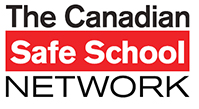 |
Starting in Vancouver, each Youth Chapter will meet monthly during the school year to discuss important safe school issues and share their ideas on resolutions. They will examine issues concerned with but not limited to LGBTQ safety and inclusion, mental health, bullying and much more. Each Youth Chapter will be lead by student mentors from local universities and overseen by a CSSN coordinator. During this time the CSSN Youth Chapters will plan and implement a youth led community project to create safer schools. Project ideas could be; workshops for peers and teachers on use of proper pronouns for LGBTQ students, teaching resources on mental health and depression, or community activity days based on inclusivity and acceptance for all students. These youth created initiatives have the potential to benefit thousands of students and teachers!
Canadian Safe School Network believes this 'bottoms up' approach will give a voice and platform to today's youth creating safer schools. The McKillen Foundation is pleased to be supporting this initiative.
Education for the Untouchables of India
The Terence & Svea McKillen Foundation is pleased to support the Freedom Through Education Project of the Dalit Freedom Network Canada (DFNC). DFNC is committed to freeing the Dalits from a life of poverty, exploitation, and slavery through education, healthcare, and economic development.
The Dalit people — also known as "Untouchables" — have been the most oppressed caste in India for over 3,000 years, living at the bottom of the country's rigid social order. The word "Dalit" means "broken, ground-down, downtrodden, or oppressed." Dalits comprise about ¼ of the population of India: that's seven times the entire population of Canada.
|
Why are Dalits "Untouchable"? In India, the mere touch of a Dalit is considered "polluting" to a caste member. Due to their low social status, Dalits often have no choice but to perform occupations that are considered "polluting," such as handling bodies in preparation for cremation, leather work, street sweeping, or removing human waste and dead animals.
What is "Caste" and the Caste System? Caste is a rigid system of social stratification from more pure (upper) to impure (lower). Caste is determined by birth and remains fixed for life. All social interaction is dictated by caste, and norms are strictly enforced by humiliation, violence, and poverty. Dalits are born below the lowest caste, and are denied access to public spaces such as schools, clinics, and temples.
What Does it Mean to be a Dalit in India Today? Dalits gained equal status under the law 60 years ago, but little has changed for them in daily life; they still face widespread discrimination. Dalits endure segregation in healthcare and housing, and are often forced to work in degrading conditions. Dalit children endure harassment from teachers and other students. Low literacy and high dropout rates are common for Dalits.
Freedom Through Education Project In the rural villages of India, Dalit parents never dreamed it would be possible for their children to receive a quality English education that would provide them with intellectual freedom, personal dignity, and spiritual hope. Through the establishment of the Good Shepherd Schools by DFN Canada, not only has education become available, but the school becomes a source of hope for the entire community. Now the Dalits can qualify for further educational opportunities as well as social and economic privileges provided by the Indian government under the Affirmative Action program. DFN Canada has pledged support to the Dalit people by providing education facilities throughout India for the Dalit children.
Transforming Faces - Cleft Lip & Palate Care
The Terence & Svea McKillen Foundation is pleased to support the work of Transforming Faces , a Canadian charity that empowers local multidisciplinary medical teams in providing free comprehensive cleft lip and palate care for children and adults in developing countries. The work allows children to live full, healthy lives.
Transforming Faces believes in comprehensive cleft care, meaning wherever possible their local cleft teams include: audiologists, dentists, nurse co-ordinators, orthodontists, social workers, speech therapists, and surgeons.
Cleft lip and palate is one of the most common birth anomalies in the world. It can be successfully treated using a comprehensive approach. With this approach, children can be socially accepted and lead a productive life.
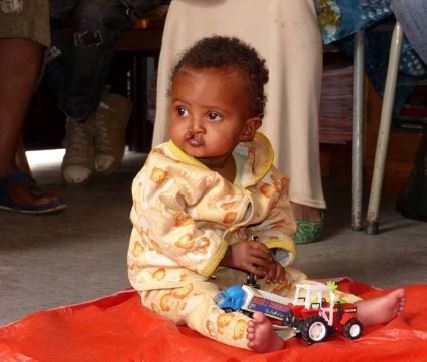 | 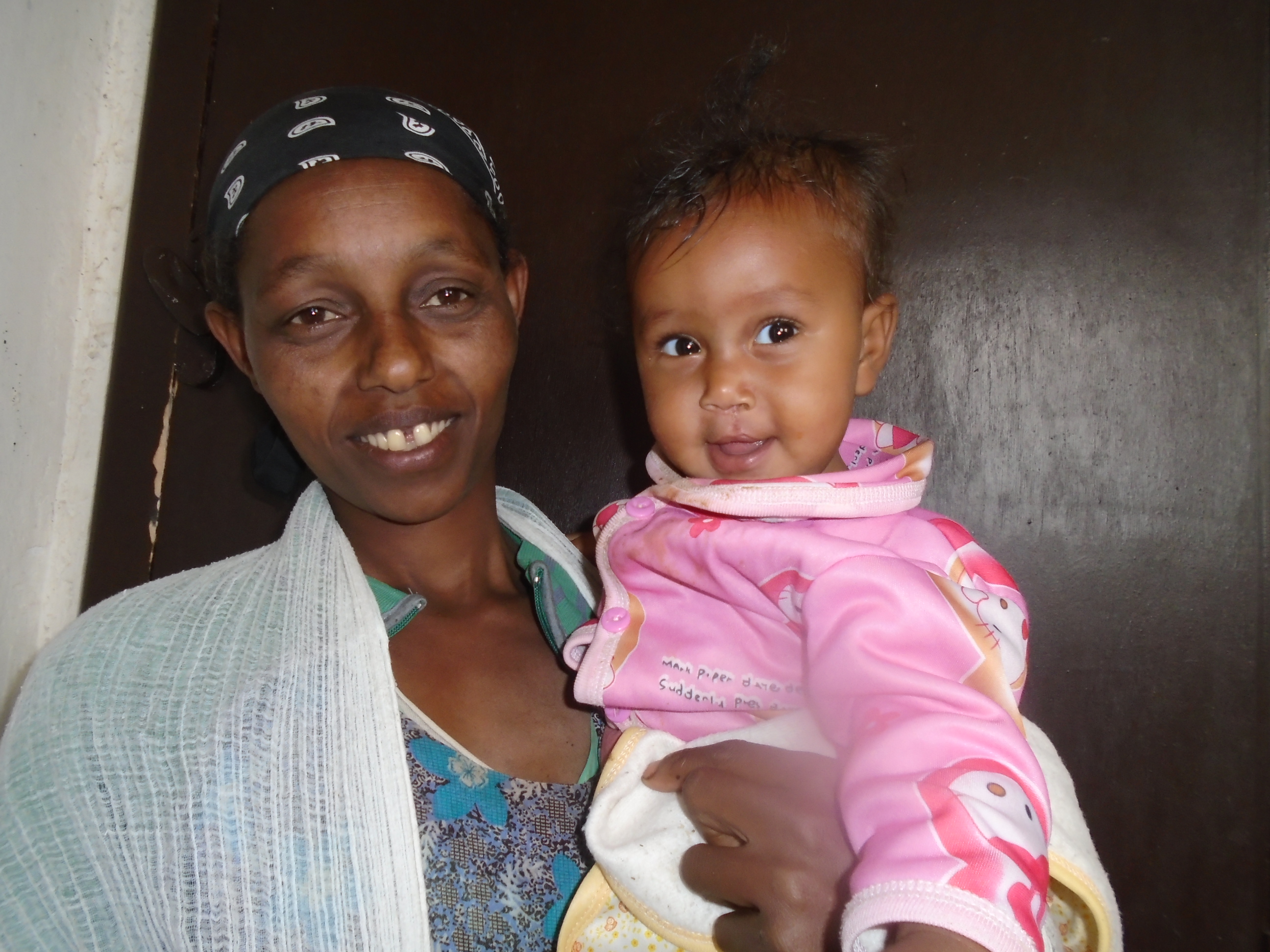
|
In 2014, the Foundation began supporting Transforming Faces' speech therapy programme in Ethiopia which is currently experiencing a severe shortage of local healthcare workers. In a country of 90 million, there are fewer than 5 known speech therapists living in Ethiopia. Over the next two years, Transforming Faces' partner hospital in Addis Ababa will provide assessments for 140 patients per year with 60 patients receiving intensive therapy. Transforming Faces believes it is better to train those already involved in their own communities and with their Ethiopian partners, plan to build an African centre of excellence in cleft lip and palate treatment and to support the development of the country's first Bachelor of Speech-Language Therapy.
In 2015, the Foundation assisted with the purchase of specialized surgical equipment for the Yekatit 12 hospital in Addis Ababa, while in 2016 and 2017, the Foundation continued to support the training of speech therapists through programs at the University of Addis Ababa and the Yekatit 12 hospital.
At Transforming Faces, every child is beautiful – before and after their cleft care. Help to 'Close the Gap' in Cleft Care and support the extension of care to the many children waiting for their chance to live a full, healthy life.
Local Outreach
The McKillen Foundation supports a number of local outreach efforts in south Mississauga as well as neighbouring communities in the GTA. These include The Compass (providing help to those from all walks of life who are currently experiencing economic, social or emotional challenges by offering practical and spiritual support); Wellspring - Birmingham Gilgan House - a beautiful, warm and welcoming facility that offers a variety of supportive care programs, at no cost, for cancer patients and their families; the United Church of Canada (local outreach to youth and those in special need); Habitat for Humanity; Heart and Stroke Foundation; and SickKids Foundation; among others.
Empowering the next generation of Canada's Aboriginal Leaders
The Terence & Svea McKillen Foundation has partnered with Free the Children in a programme to empower the next generation of aboriginal leadership in nine Cree communities of Northern Quebec. The initiative is part of an expansion of Free the Children's domestic youth empowerment programming and will be focused into Quebec's Northern Cree communities (Eeyou Istchee).
Through the delivery of this program over three academic years from 2012-2014, this partnership will educate, engage, and empower young people and help to support leadership development. The program will primarily benefit the students and educators in the schools partnering with Free The Children, but the rewards will also be felt beyond school walls, extending to families and communities as well.
Governed by the Grand Council of the Crees and the Cree Regional Authority, there are nine Cree communitie scattered across the James Bay Region of Northern Quebec. The Cree are the largest First Nation's group in Canada, with over 200,000 members, 16,000+ of whom live within the James Bay region. Living in the remote regions of Northern Quebec presents huge challenges for the youth of the communities. Malnutrition, alcoholism, and drug abuse are common challenges, and suicide remains the second most common cause of death for young aboriginal people.
Free The Children has embarked on a new partnership with the Grand Council of the Crees and the Cree Regional Authority. Eager to see their youth fulfill their potential as agents of change and become active global citizens, and recognizing Free The Children's unparalleled track record in the field of youth empowerment, the Grand Council has invited Free The Children to begin implementing its domestic programming within the nine Cree communities of the James Bay region.
Cree youth will be able to participate in We Act, a year-long domestic program that helps students identify, plan and undertake local and global actions. They will have access to character education, interactive service learning and tailored social issue actions, led by strong and relatable mentors. Students will be encouraged to discuss the issues that most affect them, and develop an action plan to make positive change in their lives. Their educators will also be trained on how to effectively inspire social action in their schools, and engage their students.
Bullying in Schools
 |
Bullying is a serious issue that touches all schools and communities across Canada. In 2001 the Canadian Safe School Network surveyed 36,799 elementary school students and 73,650 secondary school students on conditions within school. The results indicated that in elementary schools, 23% of students were afraid someone was going to hurt or bother them at school while 41% agreed there was frequent bullying taking place. 13% to 18% had been threatened or physically harmed. 74% agreed that verbal abuse took place regularly at school. In secondary schools, 19% of students were afraid someone was going to hurt or bother them at school while 44% agreed there was frequent bullying taking place. 10% to 15% had been threatened or physically harmed. 81% agreed that verbal abuse took place regularly at school.
 |
Children need to mature in safe and secure school environments. The problem of youth violence is societal in nature and not just the sole responsibility of educators to sort out in isolation. Recognizing that the problem is a shared responsibility is fundamental to the achievement of safe learning environments.
At the Terence & Svea McKillen Foundation, we are supporting The Canadian Safe School Network (CSSN) a national, not-for-profit, registered charitable organization with a mandate to reduce youth violence and make our schools and communities safer. The organization grew out of the Government of Ontario's Safe School Task Force and was launched in 1997 by representatives from police, education and business communities.
CSSN is the only organization of its kind in Canada and is recognized by national print, television and radio media as a primary source for information and comment on youth-violence issues of the day. Located in Toronto but with a national network of experts and professionals, the organization's services extend across the country.
Bringing Music to Underprivileged Children
.jpg) |
Founded in 1999, The Regent Park School of Music (RPSM) provides high quality, affordable music education to youth-in-need in Regent Park and other high priority areas in the City of Toronto including Parkdale, Jane & Finch, and Lawrence Heights. Currently there are more than 900 students enrolled in both private and group lessons. RPSM's staff, faculty and volunteers work tirelessly to ensure the safety and growth of its students.
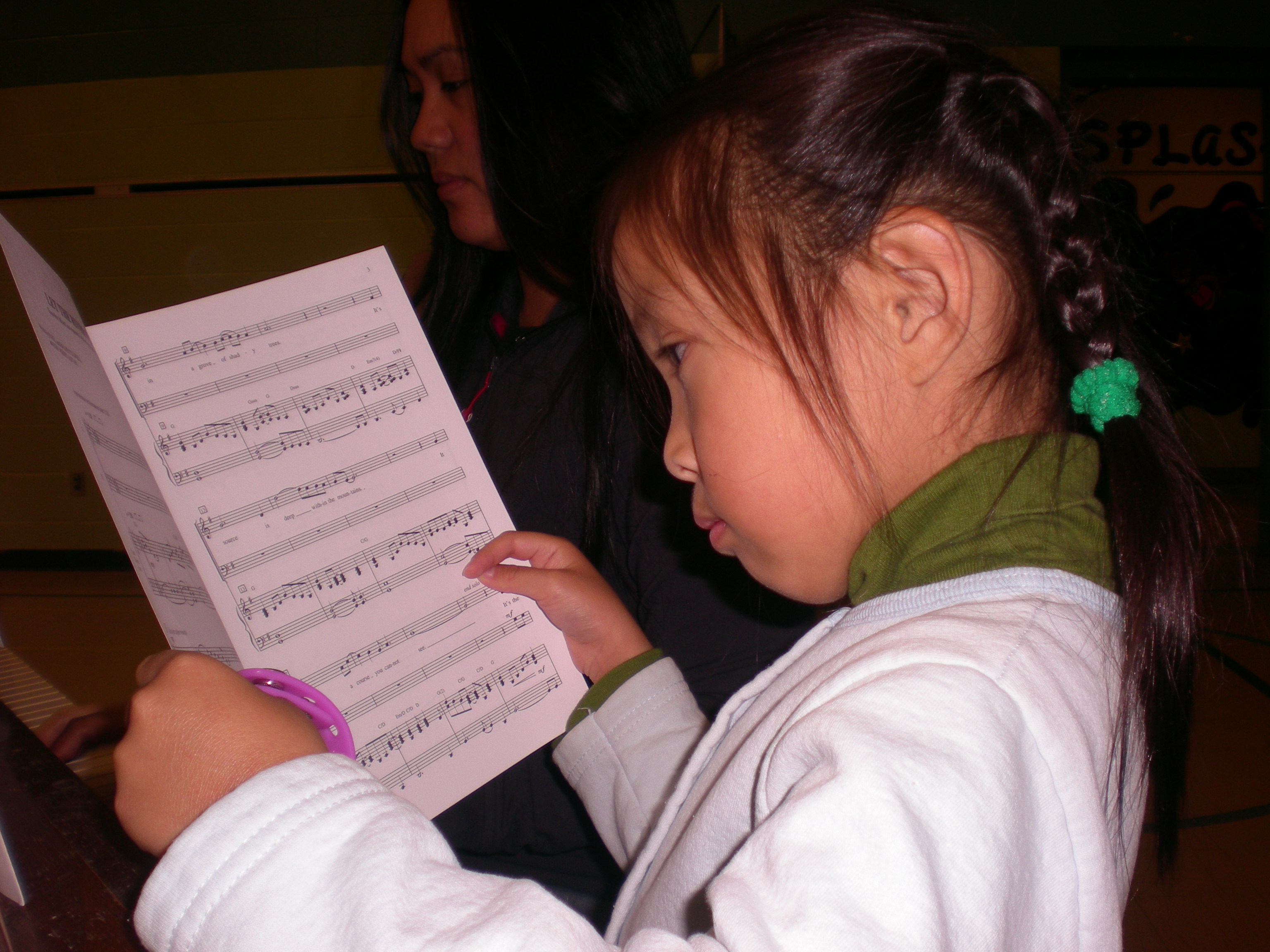 |
RPSM is currently in the third year of a five-year strategic plan that aims to reach 3,000 youth-in-need in Toronto (1,100 of which will be from Regent Park) by the end of 2015. RPSM is expanding its satellite programmes into other lower income areas of Toronto and the GTA and is working to develop innovative programmes which musically stimulate our children and provide healthy opportunities for positive peer influence and encouragement. Originally located in a little row house on Queen Street East, RPSM moved its class rooms in September 2012 to a new studio in the Regent Park Arts & Cultural Centre.
At the Terence & Svea McKillen Foundation, we believe in the importance of music in enriching the lives of children and are supporting The Regent Park School of Music. Financial support for RPSM can also be made through the RPSM Foundation, established in 2003 for the purpose of providing financial support to the school by holding and managing major assets. The RPSM Foundation manages endowed scholarship funds, bursaries, and equipment funds.
Drought and Famine in East Africa
Over the past five years, the Horn of Africa has been stricken by probably the worst drought in 60 years. Although the drought and accompanying famine, which have occurred at varying times in Sudan, Somalia, Ethiopia, Eritrea and northern Kenya, are predominantly the result of natural climatic effects, many situations have been complicated and worsened by poor agricultural practices, lack of basic infrastructure and the effects of civil war or human rights abuses.
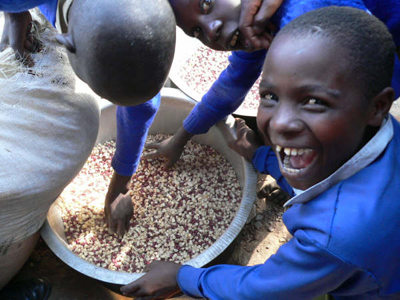 |
In 2011, the United Nations declared famine in parts of Somalia, as well as a crisis throughout much of northern Kenya. According to UNICEF, an estimated 1.25 million children across Southern Somalia are in urgent need of life saving interventions with 640,000 being acutely malnourished. The British International Development Secretary, Andrew Mitchell, was quoted as saying that up to 400,000 Somali children could die of starvation unless urgent action is taken. The UN expects at least 10 million people will need food aid in the coming months.
At the Terence & Svea McKillen Foundation, we decided to support Free The Children, an organisation founded in 1995 by then 12-year-old Craig Kielburger, in their work in East Africa. Free The Children has a 15-year history of working in the region and is seeking support for both short-term emergency food relief and long-term agricultural development programmes that will enable communities to better cope with this crisis while building towards a more sustainable future.
